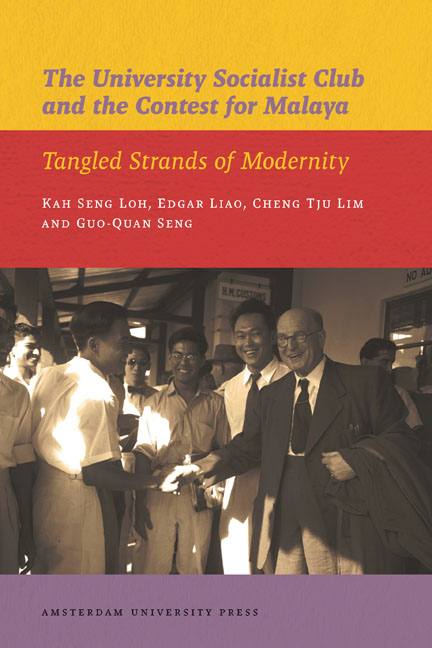Book contents
- Frontmatter
- Dedication
- Contents
- Acknowledgments
- List of Photographs
- Abbreviations
- 1 The Socialist Club and the Modernity Project
- 2 Awake in the Bowl of Night
- 3 The Fajar Trial
- 4 Visionary of the Nation, Voice of Stifled Malayans
- 5 A Beacon of Light on the Campus and Beyond
- 6 Frankly Partisan in the Struggle for Student Leadership
- 7 The Shadow over the Club
- 8 Resisting Malaysia, Swansong for Malaya
- 9 Long Night after Coldstore
- 10 In Defence of University Autonomy and Student Rights
- 11 Entwined Memories and Myths
- Conclusion: Modernity in Singapore and Malaya Reconsidered
- The University Socialists: Biographical Sketches
- Timeline of Events
- Notes
- Bibliography
- Index
- Publications Series
11 - Entwined Memories and Myths
Published online by Cambridge University Press: 21 January 2021
- Frontmatter
- Dedication
- Contents
- Acknowledgments
- List of Photographs
- Abbreviations
- 1 The Socialist Club and the Modernity Project
- 2 Awake in the Bowl of Night
- 3 The Fajar Trial
- 4 Visionary of the Nation, Voice of Stifled Malayans
- 5 A Beacon of Light on the Campus and Beyond
- 6 Frankly Partisan in the Struggle for Student Leadership
- 7 The Shadow over the Club
- 8 Resisting Malaysia, Swansong for Malaya
- 9 Long Night after Coldstore
- 10 In Defence of University Autonomy and Student Rights
- 11 Entwined Memories and Myths
- Conclusion: Modernity in Singapore and Malaya Reconsidered
- The University Socialists: Biographical Sketches
- Timeline of Events
- Notes
- Bibliography
- Index
- Publications Series
Summary
M.K. Rajakumar passed away on 22 November 2008 in Kuala Lumpur due to heart and lung complications. He was seventy-six. His family members, friends and fellow medical practitioners, politicians and University Socialist Club alumni gathered to pay tribute to his memory and life's work on two separate occasions, the first in the Malaysian capital on 4 January 2009, followed by a second in Singapore on 14 February. Among them was Poh Soo Kai, Rajakumar's old friend since 1951. At the Kuala Lumpur memorial meeting, Poh emphasised the recurring themes which underpinned Rajakumar's life and work: his concern for the poor and sick, an unwavering commitment to socialism and his contribution to student and political activism in post-war Singapore and Malaya. Describing him as “quiet and studious, witty and humorous, sincere and kind”, Poh retraced the paths he had travelled together with Rajakumar as a student activist, from the formation of the Socialist Club in 1953, their arrests for co-authoring the “Aggression in Asia” article and subsequent acquittal the following year, and their efforts in the Pan-Malayan Students’ Federation. Upon graduation, both men traversed different paths, as Rajakumar returned to Malaya and became involved in Federation politics, while Poh remained in Singapore and participated in left-wing politics until his detention in 1963 during Operation Coldstore. While apart, as Poh emphasised, their socialist commitment had evolved along similar lines, and had further been sustained by occasional discussions on the issues of the day. Having recounted the various steps of this shared intellectual journey, Poh drew a line between Rajakumar's path and his, saying: “Today I have come to terms with myself. He remains a revolutionary”. In celebrating the life and achievements of his old friend, Poh at the same time reaffirmed his own identity as a socialist and a maker of the modern Singapore and Malaya after the war.
Poh's recollections of Rajakumar's life serve as a useful point of departure for examining the memories of the Socialist Club and the differing myths which had emerged from them. In using the term “myth”, we do not refer to a fabrication of the past but to widely held beliefs for it. By comparing the memories and myths of the Club held by former University Socialists who subsequently joined the political establishment and others who remained committed to their socialist beliefs, it becomes clear that both sets of narratives do converge.
- Type
- Chapter
- Information
- The University Socialist Club and the Contest for MalayaTangled Strands of Modernity, pp. 233 - 254Publisher: Amsterdam University PressPrint publication year: 2012



